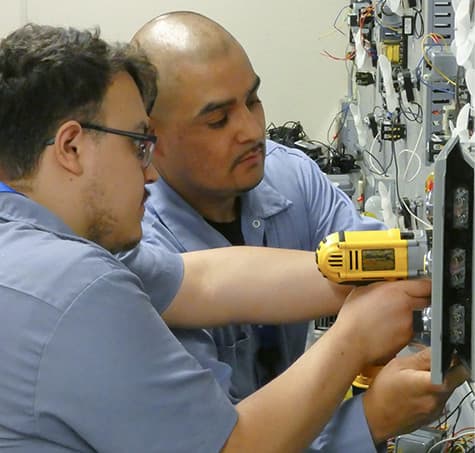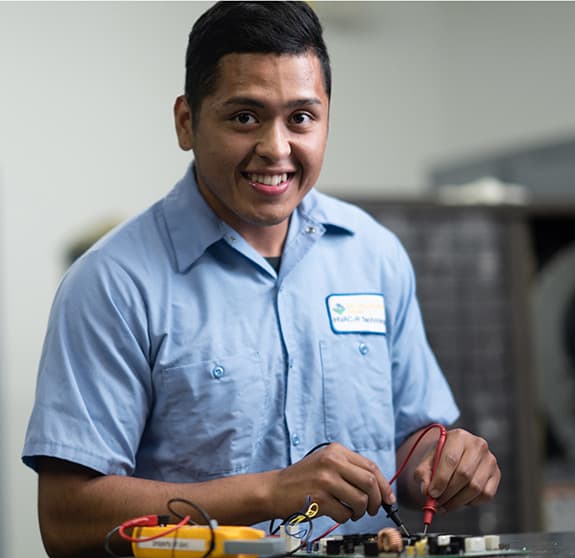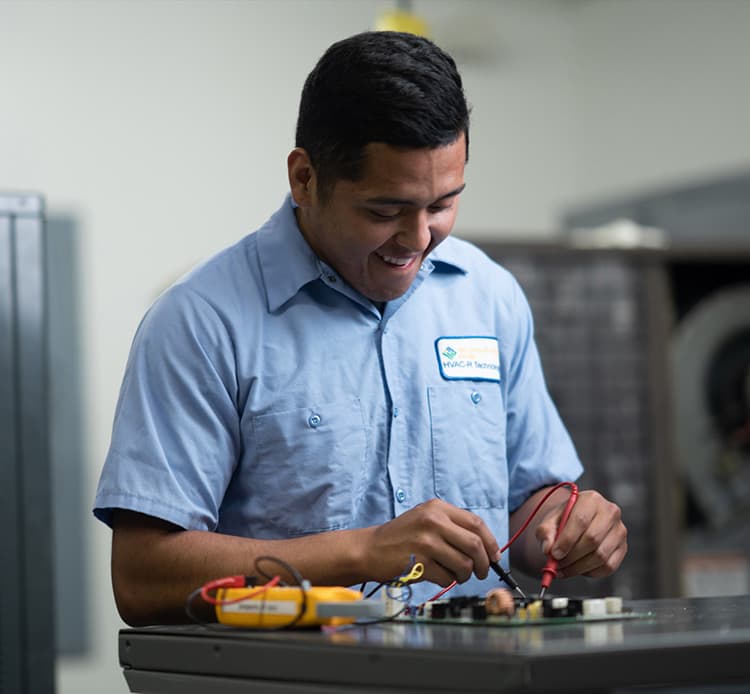Trades and Industrial Programs
Heating, Ventilation, Air Conditioning, and Refrigeration
The Heating, Ventilation, Air Conditioning and Refrigeration (HVAC-R) program at SJVC prepares you for employment in the heating and cooling industry.

REAL-WORLD SKILLS
START YOUR PATH
FLEXIBLE LEARNING OPTIONS
AFFORDABLE TUITION

Program Details
WHAT WILL I LEARN?
Students in our Heating, Ventilation, Air Conditioning, and Refrigeration program learn:
- Heating and cooling principles
- Electrical theories
- How to diagnose mechanical and electrical problems
- Proper installation, servicing, and replacement techniques
Our hands-on approach to teaching students in our Heating, Ventilation, Air Conditioning, and Refrigeration program allows them to develop the skills to work in the heating and cooling industry.
Courses* taken by our Heating, Ventilation, Air Conditioning, and Refrigeration students include:
Theory & Applications of Refrigeration
This course introduces, discusses, and practices the physical laws of matter, heat transfer, gas laws and equations, pressure and temperature conversions, refrigerants and refrigerant recovery-recycle-reclaim methods and equipment. The refrigeration cycle, basic refrigerating systems and applications, codes, installation, safety practices, and EPA information are topics covered in this course. This course discusses and applies the principles of theory and fundamentals to problem analysis and diagnostics for residential, light commercial, and commercial refrigeration systems. Students will practice the basics of brazing.
Theory and Applications of Electricity
This course introduces, discusses and applies electron flow theory, magnetism, electrical generation and power and refrigerating system components and circuits. This course identifies and discusses the control devices used in refrigeration and air conditioning systems, practices electrical drafting skills, interpretation of pictorial and ladder wiring diagrams, and problem analysis, using various diagnostic techniques for domestic and light-commercial ventilation, refrigeration, and air conditioning systems. Students will have the opportunity to earn OSHA 10-Hour Construction certification.
Air Distribution Systems
This course identifies and discusses the diagnostic and analysis of residential and commercial air distribution issues. Students will take basic air pressure measurements measuring air quantities and be able to identify and describe all different types of air-measuring devices. Students will be able to determine adequate duct sizing and placement to properly condition a given space. In addition, this course prepares the students for HVAC-R industry certification.
COST & FINANCIAL AID
Education is the most important investment you can make in your future. There is a financial plan available for everyone, including a broad range of financial assistance options. Visit SJVC’s Net Price Calculator to get personalized information on college costs and financial aid. Check out SJVC’s Academic Catalog to learn about program costs by campus and credential level. You also can talk to an Admissions Advisor to discuss the costs of your chosen program and schedule an appointment with an experienced financial aid officer. Student loans, grants, and scholarships are available to those who qualify.
PROGRAM AVAILABILITY
SJVC offers heating and air conditioning training through our Heating, Ventilation, Air Conditioning, and Refrigeration program at the following campuses:
ACCREDITATION & APPROVALS
San Joaquin Valley College’s RN program is approved by the Department of Consumer Affairs, California Board of Registered Nursing (BRN).
Institutional Accreditation
San Joaquin Valley College is accredited by the WASC Senior College and University Commission (WSCUC), 1080 Marina Village Parkway, Suite 500, Alameda, CA 94501, Phone: 510-748-9001, Fax: 510-748-9797.
The WSCUC is an institutional accrediting body recognized by the Council for Higher Education Accreditation and the U.S. Department of Education.
State Approvals
CALIFORNIA
SJVC is a private institution and is approved to operate as an accredited institution by the California Bureau of Private Postsecondary Education (BPPE). Approval to operate means that SJVC has been found in compliance with the standards set forth in the California Private Postsecondary Education Act of 2009 (as amended) and Title 5, Division 7.5, – Private Postsecondary Education of the California Code of Regulations. As a prospective student, you are encouraged to review this catalog prior to signing an enrollment agreement. You are also encouraged to review the School Performance Fact Sheet, which must be provided to you prior to signing an enrollment agreement.
A student or any member of the public may file a complaint about this institution with the Bureau for Private Postsecondary Education by calling (888) 370-7589 or by completing a complaint form, which can be obtained on the Bureau’s internet website (www.bppe.ca.gov).
View additional State Approvals for SJVC.
CONTINUING EDUCATION FOR GRADUATES
Trades Studies
Program Description
SJVC’s Trades Studies program may be completed in 25 weeks. The program is designed for trades professionals who want to advance their career and who have earned a certificate of completion in Electrical Technology; Heating, Ventilation, Air Conditioning, and Refrigeration; or Maintenance Technician from an institution of higher learning accredited by an agency that is recognized by the United States Department of Education. The Trades Studies Associate of Science degree affords excellent opportunities for professional growth and development through instruction in general education coursework designed to produce the competencies of higher education that employers expect of college graduates.
What Will I Learn?
ELECTRICAL CONCEPTS
HVAC-R THEORIES
SAFETY PRACTICES
PROPER PROCEDURES & TOOL USAGE
Ready to Do This?
Find your path in HVAC-R
Talk to an Admissions Advisor about your options and earn your Certificate of Completion in as few as 10 months.
Career Opportunities
Typically, HVAC-R Technicians work full time. Evening or weekend shifts may be required, and HVAC-R Technicians often work overtime or irregular hours during peak heating and cooling seasons.2 Employers assign HVAC techs to resolve customer issues. Self-employed technicians may be contacted directly by customers.
Heating, Air Conditioning, and Refrigeration Mechanics and installers job duties typically include:1
- Cleaning and maintaining HVAC-R systems
- Discussing system malfunctions with customers
- Inspecting and testing HVAC-R systems and components
- Installing electrical components and wiring
- Keeping records of work performed
- Recommending maintenance to improve system performance
- Repairing or replacing worn or defective parts

Check out our guide on the Heating, Ventilation, Air Conditioning and Refrigeration (HVAC-R) program
HVAC-R Technicians are vital in maintaining a comfortable and clean indoor environment, as well as food production and storage. From the manufacturer to the retailer, at home or at work, if it must be heated, cooled, and conditioned, there is an HVAC-R Technician making it happen. Find out more about what an HVAC-R Technician does, the education to become a technician and more facts to begin your HVAC-R Technician training.

Successful Grads
Ask one of our graduates about their SJVC experience and they’ll likely describe it as life-changing.
Request Information
All fields using an asterik (*) are required.
Heating, Ventilation, Air Conditioning and Refrigeration (HVAC-R) FAQs
What does HVAC stand for?
How to become an HVAC technician?
Is HVAC a good career?
How Long is HVAC?
Disclaimer
*Course listings are subject to change. Reference the SJVC College Catalog for the most current program information.